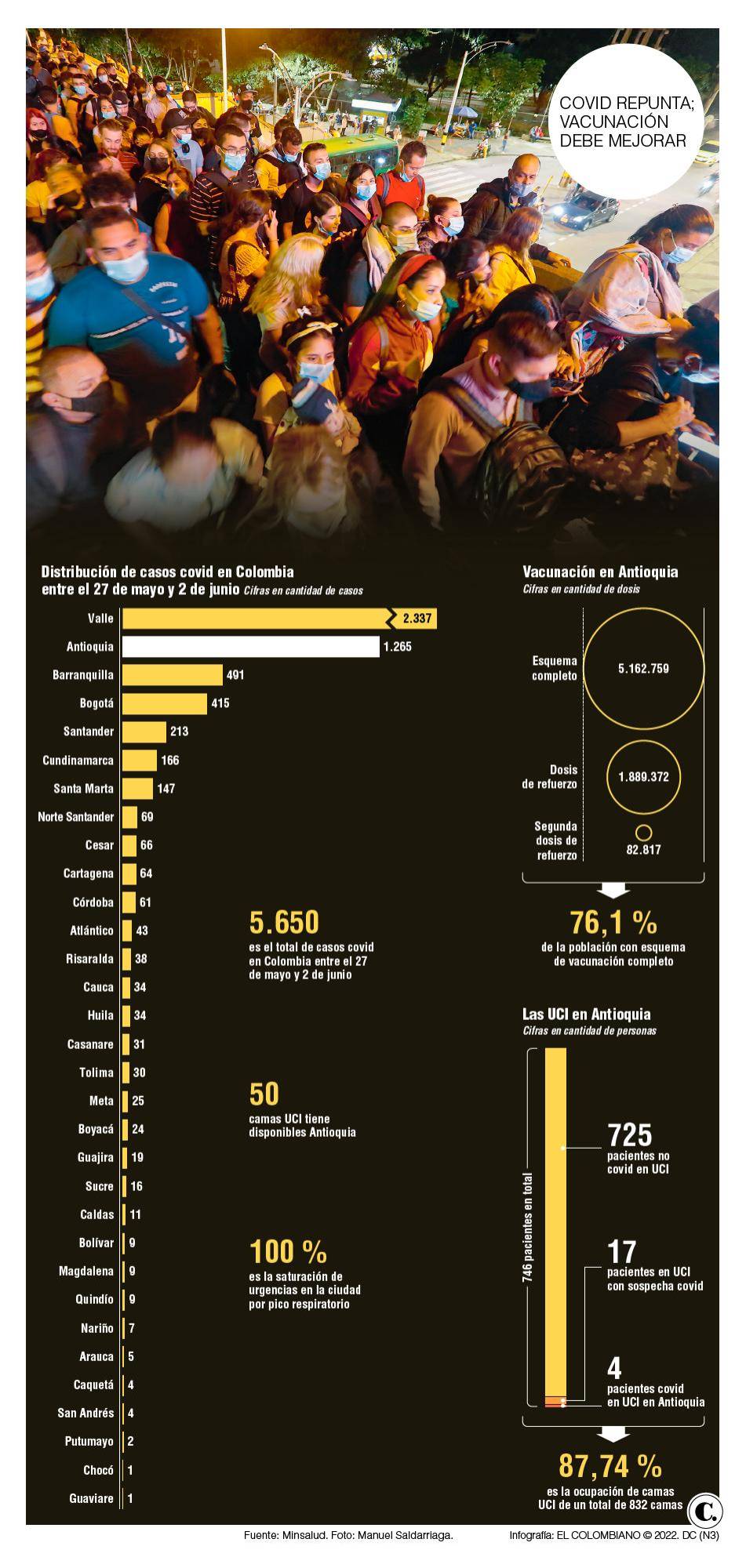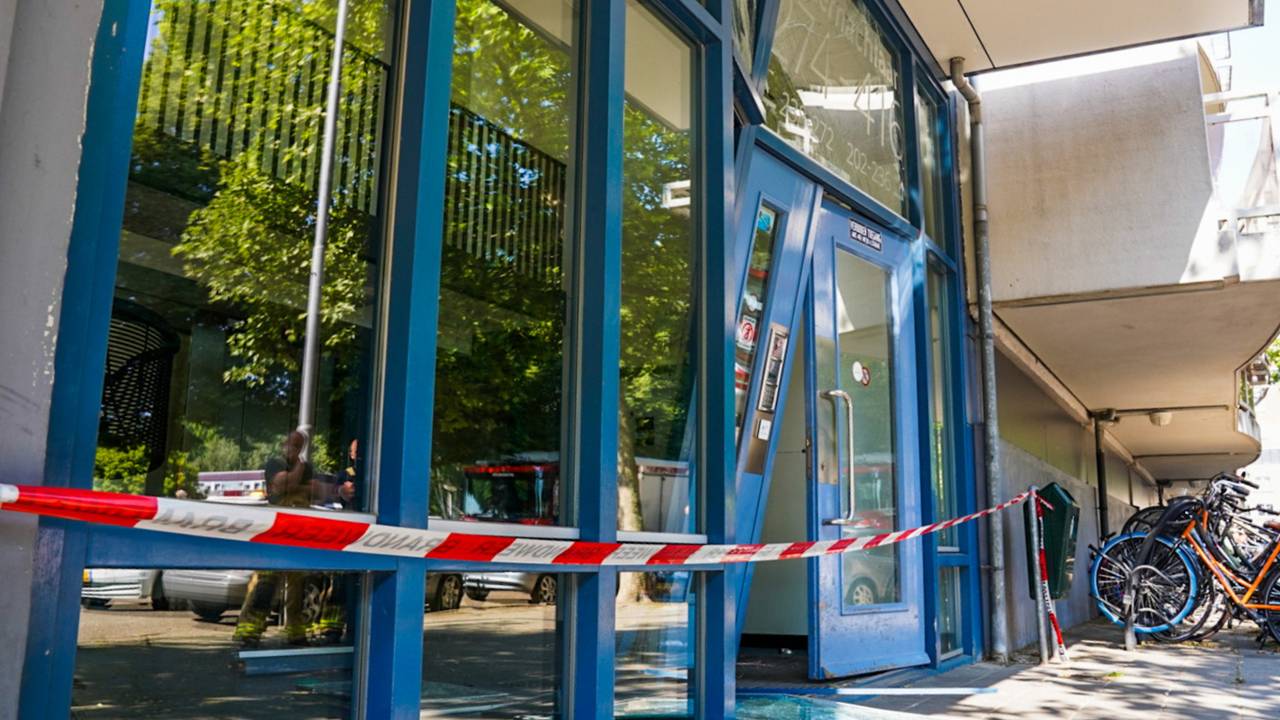 – –
– –
Colombians are no longer worried about the pandemic. In the Invamer survey on the national situation last March, for the first time in two years, concern about the coronavirus among those surveyed was 0%. But that doesn’t mean the virus is gone.
In the last weekly bulletin, which runs from May 27 to June 2, the Ministry of Health reported 1,265 cases in Antioquia. Leopoldo Giraldo, manager for the care of the pandemic, pointed out that positivity in the department went from 5.7 to 8. Rather, for every 100 covid tests that are carried out, eight are positive.
It is a wake-up call, although no indication shows, for now, the possibility that a new peak may occur with the severe consequences already known.
According to Giraldo, although the average number of hospitalizations in the department went from 25 to 41 cases, the occupation of ICU beds has remained stable for exactly one month, with an average of five covid patients treated in intensive care. ICU occupancy in general is at 88%.
Also in these last four weeks, the weekly number of deaths from the virus has been one or two cases. Even in the latest Ministry report, the department reported no deaths.
That there are no indications of severity in the cases or pressure on hospital services is part of the calm in the midst of this slight rebound, although Giraldo warns that this should not hide the fact that the department still has pending tasks. And he specifically refers to vaccination.
Antioquia currently has 89% of its population with at least one dose; 76.1% with a complete schedule, including a single dose; and 43.73% with a booster dose.
These are good numbers, but not enough to get rid of epidemiological risks, because as Giraldo pointed out, the population between 3 and 12 years of age continues to have a red balance in vaccination and only 46% have been immunized with a complete schedule. He means that there are more than 450,000 children in the department without protection against the virus.
The booster dose also seems to have reached a ceiling, with a particular apathy on the part of the working-age population. More than 900,000 people between the ages of 30 and 59 in Antioquia still do not go to receive a booster dose.
–
covid is not alone
To the 3,569 people with covid currently in Antioquia is added an undetermined number of people who suffer from various infectious conditions due to the peak of respiratory diseases that the department is going through and that will still have several weeks ahead in June before declining.
The respiratory peak appears every year around this same time, but it currently has a peculiarity. Although normally two viruses predominate in these peaks, at this time there are at least four: Rhinovirus, Adenovirus, Parainfluenza and Respiratory Syncytial Virus (RSV), mainly affecting children, according to Andrés Uribe, specialist in Pediatrics and scientific leader of the Neonatal ICU of the Bolivarian University Clinic.
The delicate aspect of this panorama is that although the pandemic does not currently generate significant pressure on hospital services, the convergence of infections among the population due to various viruses does generate a latent risk of collapse.
Since last week, emergency services for adults in the metropolitan area have been full and pediatrics had a saturation that has reached 200% for several days. The situation has generated more cases of aggression against health personnel.
Doctor Jorge Iván Posada, president of the Antioquia Physicians Association – Asmedas – says that citizens cannot discharge all responsibility for the preventive management of epidemiological events on the authorities and medical personnel, because precisely the two years of the pandemic left very clear instructions on what must be done to guarantee the well-being of the population and avoid severe measures and consequences.
For this reason, faced with the increase in complaints from people due to the refusal of their employers to allow them to isolate themselves preventively and provide them with guarantees to work remotely in the event of the appearance of symptoms due to infectious conditions, doctor Posada reminds businessmen and the productive sector of the commitment that they acquired with the National Government to act responsibly in matters of public health.
It also considers that it is pertinent to return the mask to some public places, such as nightclubs and closed restaurants. On this there are divided opinions. There are experts who consider that at this point it is necessary to let the criteria of citizenship prevail in each situation.
– –


